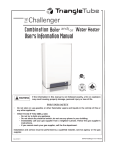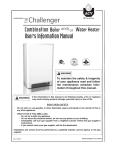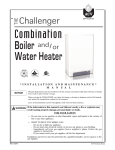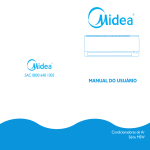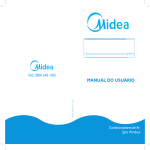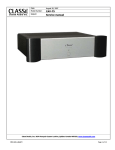Download User`s Guide - SupplyHouse.com
Transcript
Boiler User s Information Manual WARNING If the information in this manual is not followed exactly, a fire or explosion may result causing property damage, personal injury or loss of life. FOR YOUR SAFETY • Do not store or use gasoline or other flammable vapors and liquids in the vicinity of this or any other appliance. • WHAT TO DO IF YOU SMELL GAS - Do not try to light any appliance - Do not touch any electrical switch; do not use any phone in your building. - Immediately call your gas supplier from a neighbor’s phone. Follow the gas supplier’s instructions. - If you cannot reach your gas supplier, call the fire department. Installation and service must be performed by a qualified installer, service agency or the gas supplier. Date 8/9/2011 2011-37 Challenger Solo User’s Manual Table of Contents PRODUCT & SAFETY INFORMATION Page 1 Service and Maintenance CHALLENGER Operation Appliance & System Water SECTION I - Combustion Air - Prevention of Contamination Page 2 Potential Contaminating Products Areas likely to find these Products SECTION II - Maintenance Schedule Page 3 Service Technician Owner Maintenance SECTION III - Maintenance Procedures Page 4 Periodic Maintenance Monthly Maintenance 6-Month Maintenance SECTION IV - Operations Instructions Page 7 SECTION V - Appliance Control Display Page 8 Replacement Parts Page 13 i Product & Safety Information Definitions The following terms are used throughout this manual to bring attention to the presence of potential hazards or important information concerning the product. DANGER NOTICE Indicates the presence of a hazardous situation which, if ignored, will result in death, serious injury or substantial property damage. Indicates special instructions on installation, operation or maintenance, which are important to equipment but not related to personal injury hazards. WARNING Indicates a potentially hazardous situation which, if ignored, can result in death, serious injury or substantial property damage. BEST PRACTICE Indicates recommendations made by Triangle Tube for the installers which will help to ensure optimum operation and longevity of the equipment. CAUTION Indicates a potentially hazardous situation which, if ignored, may result in minor injury or property damage. NOTICE Triangle Tube reserves the right to modify the technical specifications and components of its products without prior notice. ii Product & Safety Information PRODUCT & SAFETY INFORMATION CHALLENGER Operation • Do not block flow of combustion air to the CHALLENGER. If the combustion air blockage is easily accessible and removable, then remove it. If blockage is not obvious or cannot be removed, have the appliance and system checked by a qualified service technician. • Do not allow contaminated air to enter the appliance’s combustion air inlet. See page 2 for details. • The CHALLENGER is equipped with a low water cut off device. The CH (central heating) system piping must be filled and pressurized to 12 psig [0.8 bar] prior to startup. The appliance will shut down if the pressure falls below 7 psig [0.5 bar]. • Should overheating occur or the gas supply fail to shut off, DO NOT turn OFF or disconnect the electrical supply to the pump. Instead, shut off the gas supply at a location external to the appliance. • Do not use this appliance if any part has been under water. Immediately call a qualified service technician to inspect the appliance and to replace any part of the control system and any gas control, which has been under water. WARNING HOMEOWNER: The CHALLENGER installation manual is for use only by a qualified heating installer / service technician. Refer to this User’s Information Manual for your reference. Failure to comply could result in severe personal injury, death or substantial property damage. NOTICE TECHNICIAN: When calling or writing about the CHALLENGER, please have the appliance model and serial number available. STOP! READ BEFORE SERVICING WARNING Failure to adhere to the guidelines on this page can result in severe personal injury, death or substantial property damage. Appliance & System Water Service and Maintenance • Have the appliance and system water chemistry checked at least annually by a qualified service technician. • Do not use petroleum-based cleaning or sealing compounds in the appliance or system. Gaskets and seals in the system may be damaged. This can result in substantial property damage. • Do not use any product not specifically designed for hydronic heating systems. Serious damage to the appliance, piping system, personnel and / or property may result. • Continual fresh makeup water will reduce the life of the CHALLENGER. Addition of oxygen can cause internal corrosion in the system components. All leaks in the piping system must be repaired at once to prevent makeup water. • Do not add cold water to a hot appliance. Thermal shock can cause premature failure to the appliance heat exchanger. • To avoid electric shock, disconnect electrical supply before performing service or maintenance. • Allow the appliance to cool down prior to servicing to avoid severe burns. • The CHALLENGER must be maintained as outlined in this manual and have at least annual service performed by a qualified service technician to ensure appliance / system reliability. 1 Combustion Air - Prevention of Contamination SECTION I - COMBUSTION AIR - PREVENTION OF CONTAMINATION Potential Contaminating Products WARNING If the CHALLENGER combustion air inlet is located in any area likely to cause or contain contamination, or if products, which would contaminate the air cannot be removed, the combustion air must be repiped and terminated to another location. Contaminated combustion air will damage the appliance and its burner system, resulting in possible severe personal injury, death or substantial property damage. WARNING Do not operate a CHALLENGER if its combustion air inlet or the appliance is located in or near a laundry room or pool facility. These areas will always contain hazardous contaminates. Pool and laundry products and common household and hobby products often contain fluorine or chlorine compounds. When these chemicals pass through the burner and vent system, they can form strong acids. These acids can create corrosion of the heat exchanger, burner components and vent system, causing serious damage and presenting a possible threat of flue gas spillage or water leakage into the surrounding area. - Spray cans containing chloro/fluorocarbons - Permanent Wave Solutions - Chlorinated wax - Chlorine - based swimming pool chemicals and spa cleaners - Calcium Chloride used for thawing ice - Sodium Chloride used for water softening - Refrigerant leaks - Paint or varnish removers - Hydrochloric acid / muriatic acid - Cements and glues - Antistatic fabric softeners used in clothes dryers - Chlorine-type bleaches, detergents, and cleaning solvents found in household laundry rooms - Adhesives used to fasten building products and other similar products Areas likely to find these products Please read the following information. If contaminating chemicals will be present near the location of the combustion air inlet, the installer should pipe the combustion air inlet to another location per the CHALLENGER installation manual. 2 - Dry cleaning / laundry areas and establishments - Beauty salons - Metal fabrication shops - Swimming pools and health spas - Refrigeration Repair shops - Photo processing plants - Auto body shops - Plastic manufacturing plants - Furniture refinishing areas and establishments - New building construction - Remodeling areas - Garages with workshops Maintenance Schedule SECTION II - Maintenance Schedule Owner Maintenance Service Technician Periodic At least on an annual basis the following maintenance should be performed by a qualified service technician: - Check the area around the appliance. - Check and remove any blockage from the combustion air inlet and ventilation openings. - Check the temperature/pressure gauge. General - Attend to any reported problems. - Inspect the interior of the appliance jacket area; clean and vacuum if necessary. - Clean the condensate drain assembly and fill with fresh water. - Check vent piping. - Check combustion air inlet piping. - Check for leaks: water, gas, flue and condensate. - Check the pressure relief valve. - Verify flue vent piping and air inlet piping are in good condition, sealed tight and properly supported. - Check the condensate drain assembly. - Check appliance water pressure, piping and expansion tank. Every 6 months: - Check control settings. - Check ignition electrode (sand off any white oxide; clean and reposition). - Check ignition wiring and ground wiring. - Check all control wiring and connections. - Check burner flame pattern (stable and uniform). Monthly: Clean heat exchanger and flue ways. - Remove burner assembly and clean burner head using compressed air only. Check appliance piping and gas supply piping for corrosion or potential signs of leakage. - Operate the pressure relief valve. WARNING Follow the maintenance procedures given throughout this manual. Failure to perform the service and maintenance or follow the directions in this manual could result in damage to the CHALLENGER or in system components, resulting in severe personal injury, death or substantial property damage. Additional items if combustion or performance is poor: - - Once the maintenance items are completed, review the service with the owner. 3 Maintenance Procedures SECTION III - MAINTENANCE PROCEDURES 1. Combustible / flammable materials - Do not store combustible materials, gasoline or other flammable vapors or liquids near the appliance. Remove immediately if found. WARNING 2. Air contaminates - Products containing chlorine or fluorine, if allowed to contaminate the combustion air, will cause acidic condensate within the appliance. This will cause significant damage to the appliance. Read the list of potential materials listed on page 2 of this manual. If any of these products are in the room from which the appliance takes its combustion air, they must be removed immediately or the combustion air intake must be relocated to another area. The CHALLENGER must be inspected and serviced annually, preferably at the start of the heating season, by a qualified service technician. In addition, the maintenance and care of the appliance as outlined on page 3 and further explained on pages 4 through 6 must be performed to assure maximum efficiency and reliability of the appliance. Failure to service and maintain the CHALLENGER and the system components could result in equipment failure, causing possible severe personal injury, death or substantial property damage. Check Combustion Air Inlets 1. Verify that ventilation air openings to the mechanical room are open and unobstructed. NOTICE The following information provides detailed instruction for completing the maintenance items outlined in the maintenance schedule on page 3. In addition to this maintenance, the CHALLENGER should be serviced at the beginning of the heating season by a qualified service technician. 2. Verify that the appliance’s vent termination and combustion air intake are clean and free of obstructions. Remove any debris on the air intake or flue exhaust openings. If removing the debris does not allow the appliance to operate correctly, contact your qualified service technician to inspect the appliance and the vent / combustion air system. Periodic Maintenance Check Temperature Display and Pressure Gauge Check the Surrounding Area 1. Ensure the pressure reading on the pressure gauge does not exceed 25 psig [1.7 bar]. Higher pressure readings may indicate a problem with the expansion tank. WARNING To prevent potential of severe personal injury, death or substantial property damage, eliminate all the materials listed on page 2 from the area surrounding the appliance and from the vicinity of the combustion air inlet. If contaminates are found: 2. Ensure the temperature on the display panel does not exceed 194ºF [90ºC]. Higher temperature readings may indicate a problem with the operating thermostat controls. 3. Contact a qualified service technician if problem persists. Remove products immediately from the area. If they have been there for an extended period, call a qualified service technician to inspect the appliance for possible damage from acid corrosion. If products cannot be removed, immediately call a qualified service technician to re-pipe the combustion air inlet piping and locate the combustion air intake away from the contaminated areas. 4 Maintenance Procedures Monthly Maintenance WARNING Check Vent Piping Under some circumstances the CHALLENGER may not produce enough condensate to keep the condensate trap full of liquid. If the trap is not full, small amounts of flue gases can be emitted into the surrounding area through the condensate drain line. 1. Visually inspect the flue gas vent piping for any signs of blockage, leakage or deterioration of the piping. Notify a qualified service technician immediately if any problems are found. 3. Ensure the condensate drain line is not blocked by pouring water through the top open port on the condensate drain assembly. The water should flow out of the end of the drain line. If water does not appear at the end of the drain line, contact a qualified service technician to inspect and clean the condensate line. WARNING Failure to inspect the venting system as noted and have it repaired by a qualified service technician can result in the vent system failure, causing severe personal injury or death. 4. To fill the condensate drain assembly, slowly pour water into the top of the trap assembly until water appears at the end of the drain line. Stop filling. Check Combustion Air Inlet Piping 1. Visually inspect the combustion air inlet piping for any signs of blockage. Inspect the entire length of the combustion air inlet piping to ensure piping is intact and all joints are properly sealed. Check Automatic Air Vents (If Used) 1. Remove the cap “A” from any automatic air vent in the system and check operation by depressing valve “B” slightly with the tip of a screwdriver. See Fig. 1. 2. Notify a qualified service technician if any problems are found. 2. If the air vent valve appears to be working freely and not leaking, replace cap “A”, screwing it on fully. Check Pressure Relief Valve 1. Visually inspect the primary pressure relief valve and the relief valve discharge pipe for signs of weeping or leakage. 3. Loosen cap “A” one full turn to allow vent to operate properly. 4. Have the air vent replaced by a qualified service technician if it does not operate correctly. 2. If the pressure relief valve often weeps, the expansion tank may not be operating properly. Immediately contact a qualified service technician to inspect the unit and system. A Check Vent Condensate Drain Assembly B 1. While the appliance is operating, check the discharge end of the condensate drain tubing. Ensure no flue gas is leaking from the condensate drain tubing by holding your fingers near the termination. 2. If you notice flue gas leaking from the opening, this indicates a dry condensate drain trap. Fill the condensate trap assembly. Contact a qualified service technician to inspect the appliance and condensate line and refill the condensate trap if problem persists regularly. Fig. 1: Automatic Air Vent 5 Maintenance Procedures 6-Month Maintenance 2. Read the temperature and pressure gauge to ensure the system is pressurized. Lift the relief valve top lever slightly, allowing water to relieve through the valve and discharge piping. Check Water and Gas Piping 3. If water flows freely, release the lever and allow the valve to seat. Watch the end of the relief valve discharge pipe to ensure that the valve does not weep after the line has had time to drain. If the valve weeps, lift the lever again to attempt to clean the valve seat. If the valve does not properly seat and continues to weep afterwards, contact a qualified service technician to inspect the valve and system. 1. Remove the appliance front jacket panel and perform a gas leak inspection per steps 1 through 6 of the Operating Instructions on page 7. If gas odor or leak is detected, immediately shut down the appliance following procedures on page 7. Call a qualified service technician. 2. Visually inspect for leaks around the internal appliance water connections and around the heat exchanger. Visually inspect the external system piping, circulators, and system components and fittings. Immediately call a qualified service technician to repair any leaks. 4. If the water does not flow from the valve when you lift the lever completely, the valve or discharge line may be blocked. Immediately shut the appliance down per the instructions on page 7. Call a qualified service technician to inspect the valve and system. WARNING Have leaks fixed at once by a qualified service technician. Failure to comply could result in severe personal injury, death or substantial property damage. Operate Pressure Relief Valve 1. Before proceeding, verify that the relief valve outlet has been piped to a safe place of discharge, avoiding any possibility of scalding from hot water. WARNING To avoid water damage or scalding due to valve operation, a discharge line must be connected to the relief valve outlet and directed to a safe place of disposal. This discharge line must be installed by a qualified service technician or heating / plumbing installer in accordance with the CHALLENGER installation manual. The discharge line must be terminated so as to eliminate possibility of severe burns or property damage should the valve discharge. 6 Operating Instructions SECTION IV - OPERATING INSTRUCTIONS FOR YOUR SAFETY READ BEFORE LIGHTING WARNING If you do not follow these instructions exactly, a fire or explosion may result causing property damage, personal injury or loss of life. A. This appliance does not have a pilot. It is equipped with an ignition device which automatically lights the burner. DO NOT try to light the burner by hand. B. BEFORE OPERATING, smell all around the appliance area for gas. Be sure to smell next to the floor because some gas is heavier than air and will settle on the floor. WHAT TO DO IF YOU SMELL GAS • Do not try to light any appliance. • Do not touch any electric switch; do not use any phone in your building • Immediately call your gas supplier from a neighbor’s phone. Follow the gas supplier’s instructions. • If you cannot reach your gas supplier, call the fire department. C. Use only your hand to turn the external manual gas valve. Never use tools. If the valve will not turn by hand, don’t try to repair it; call a qualified service technician. Force or attempted repair may result in a fire or explosion. D. Do not use this appliance if any part has been under water. Immediately call a qualified service technician to inspect the appliance and to replace any part of the control system and any gas control which has been under water. OPERATING INSTRUCTIONS 1. STOP! Read the safety information above. This appliance is equipped with an ignition device which automatically lights the burner. DO NOT try to light the burner by hand. 2. Set room thermostat(s) to lowest setting. Turn the external manual gas valve handle clockwise “CLOSE” (valve handle shall be perpendicular to gas piping). 3. Turn “OFF” all electrical power to the appliance. 4. Remove the front jacket panel on the appliance. 5. Turn the external manual gas valve handle counter clockwise to “OPEN” gas supply (valve handle shall be parallel to gas piping). 6. Wait five (5) minutes to clear out any gas. If you then smell gas in the jacket enclosure or around the appliance, STOP! Follow “B” in the safety information above. If you don’t smell gas, go to the next step. 7. Turn “ON” all electric power to the appliance. Push ON/OFF button on the CHALLENGER control panel display until LED above button is lit. 8. Set room thermostat(s) to desired setting(s). 9. The CHALLENGER control panel display will show a sequence of numbers (1,2,3,4) as the right digit. Sequence digit 3 or 4 indicates the appliance is firing. A blank display means there is no call for heat (all external thermostats are satisfied). 10. If the appliance will not operate with a call for heat and the system piping is not hot, follow the instructions “To Turn Off Gas to Appliance”, below and call your service technician or gas supplier. 11. Replace the front jacket panel. Make sure the panel is seated firmly in place and all mounting screws are tightened. TO TURN OFF GAS TO APPLIANCE 1. Set the room thermostat to lowest setting. 2. Turn“OFF” all electric power to the appliance if service is to be performed. 3. 7 Turn the external manual gas valve handle clockwise to “CLOSE”, (valve handle shall be perpendicular to gas piping). Appliance Control Display SECTION V - Appliance Control Display Operation Read-Out A. On/Off button B. Parameter button C. - button D. + button E. Units U.S. customary or metric F. Not applicable G. Service button H. Reset/store button 1. On/Off (Lit when on) 2. CH operation or setting maximum CH temperature 3. DHW operation with optional Triangle Tube SMART I.F.W.H 4. Main display with temperature water pressure or fault code 5. Temperature ºF or pressure psi 6. Temperature ºC or pressure bar 7. Not applicable 8. Not applicable 9. Operating display 10. Flashes to indicate fault Appliance ON/OFF Units 1. The appliance operation is started using the ON/OFF button. Press Up or Down arrow button to change the displayed units from U.S. Customary (ºF or psi) to metric (ºC or bar). The ºF/psi LED will be lit for U.S. Customary units or ºC/bar LED will be lit for metric units. 2. When appliance is in operation, the green LED above the ON/OFF will be lit. 3. When the appliance is not in operation, the green LED above the ON/OFF will not be lit. The main display will show “OFF” and the operating display will show . NOTICE Units cannot be changed if the main display (Parameter Mode) or operating display (Error Mode) is flashing. 8 Appliance Control Display Function Main Display Operating Display Press button to turn appliance ON LED lite above button will be lit when appliance is ON OFF XXP No demand for heat XXP A Control self-test XXX 1 Fan pre purge or post purge cycle XXX 2 Ignition sequence XXX 3 Burner ON for space heating (CH) XXX 4 Burner ON for domestic hot water (DHW) with optional Triangle Tube SMART I.F.W.H. XXX 6 Burner OFF due to reaching temperature setpoint 7 Space Heating (CH) post pump cycle 9 Burner ON for freeze protection Raise CH pressure above 7 psig [0.5 bar] LOP* The The LED will be lit for CH (central heating call) LED will be lit for DHW (domestic hot water call) with optional Triangle Tube SMART I.F.W.H. NOTICE “X” represents temperature or pressure readings. When temperature is displayed it will be followed by “ºF” or “ºC” in the main display and the appropriate LED will be lit. When pressure is displayed it will be followed by a “P” in the main display. Pressure can only be read when the operating display is blank or shows a “A”. * If factory installed CH Low Water Cut Off (LWCO) is below 7 psig [0.5 bar] the main display will flash a soft lockout of LOP (burner and CH primary pump is blocked) followed by the pressure reading. Once CH system pressure is increased above 7 psig [0.5 bar] normal boiler operation will be restored. Check LWCO wiring if LOP flashes to 90 _P (PSI) or 6.0 _P (bar). 9 Appliance Control Display Setting the Appliance Parameters 5. After all parameters have been changed, press the button to close the setting menu and store the changes. The main display will go blank and a P will be displayed in the operating display to let you know the control was programmed. 1. Press the “ ” button at the display panel for approximately 2 to 3 seconds until main display begins to flash. 2. Press the “ ” button repeatedly to scroll through the list of parameters. The operating display will show the parameter number and main display will show the parameter setting. 3. To modify a parameter press the or NOTICE If the reset button is not pressed within 30 seconds, the settings menu is automatically closed and the changes are stored. buttons. 4. Press the “ ” button to scroll to the next parameter to be changed. Main Display If the ON/OFF button is pressed prior to the resets button, the settings menu is closed and the changes are NOT stored. Operating Display Factory Settings Parameters LED (Flashing) (Flashing) 186ºF [86Cº] Description Adjustments 120ºF [49Cº] 0 1 Boiler set point temperature Not applicable Installation type Adjustment range 86ºF to 194ºF [30ºC to 90ºC] Adjustment range 104ºF to 149ºF [40ºC to 65ºC] 0=Combi (Heat and DHW) 1=Heating + SMART I.F.W.H. 2=DHW only (no heating system required) 3=Heating only 0 2 CH pump continuous 86ºF [30Cº] 0ºF [-18Cº] 64 ºF [18Cº] 1 5 6 7 8 0 o Min. supply temperature of the heat curve Min. outside temperature of the heat curve Max. outside temperature of the heat curve CH pump post purge period Not applicable Adjustment range 60°F to 140°F [16ºC to 60ºC] Adjustment range -22°F to 50°F [-30ºC to 10ºC] Adjustment range 60°F to 78°F [16ºC to 26ºC] Adjustment range 0 to 15 minutes Adjustment range 0 to 15 minutes 0 P Anti-cycling period during CH operation 1 Minimal switch-off time in CH operation Adjustable from 0 to 15 minutes 0=Intermittent pump on for heat and post purge 1=Pump continously active except during DHW call or if outside temperature is above parameter 7 with the outdoor sensor installed - Warm Weather Shut Down. 1 The anti-cycling time starts when burner shuts down during a CH call due to boiler water reaching the boiler set point temperature plus a 6ºF [3ºC] differential. The CH circulator will continue to operate while the burner is blocked. 10 Appliance Control Display Error (Hard Lockout) Mode If a system fault occurs, the system enters a hard lockout condition which requires a manual reset by pressing the RESET button . A hard lock is indicated by a flashing [E] on the operating display as well as a flashing LED light above the reset button. The error code is located on the main display. The error must be corrected before the control will reset. CAUTION The appliance freeze protection feature is disabled during a Hard Lockout, however the CH circulator will operate. CAUTION During a hard lockout or low water condition the appliance will not re-start without service. If the heating system is left unattended in cold weather appropriate safeguards or alarms should be installed to prevent property damage. Table 6: 12 K Ohm NTC Sensor Resistance 11 Appliance Control Display Error (Hard Lockout) Codes* Main Display Operating Display (Flashing) Possible Solution Error Description • Check wiring for break • Check for proper flow direction • Replace S1 • E10 Open sensor • E 11 Shorted sensor • E12 Decreased too quickly • E13 Increased too quickly • E14 Stuck E - CH supply sensor fault S1 20, 21, 22, 23, 24 E - CH return sensor fault S2 0 E - Sensor fault after self check 1, 28 E - Temperature too high 2 E - CH supply sensor S1 and CH return sensor S2 interchanged • Check for proper flow direction • Replace S1 or S2 10, 11, 12, 13, 14 • Check wiring for break • Check for proper flow direction • Replace S2 • E 20 Open sensor • E 21 Shorted sensor • E22 Decreased too quickly • E23 Increased too quickly • E24 Stuck • Replace S1 and/or S2 • Air in installation • Pump not running • Insufficient flow in installation, shut off valves closed, pump setting too low • CHeck for wiring 4 E - No flame signal • Manual gas shut off valve closed • Remove air from gas pipe • Gas supply pressure too low or failing • Gas valve or ignition unit not powered • Incorrect ignition gap • Check adjustment of gas valve 5 E - Poor flame signal • Condensate drain blocked • Check adjustment of gas valve 6 E - Flame detection fault • Replace ignition cable + spark plug cap • Replace ignition unit at gas valve • Replace boiler controller 8 E - Incorrect fan speed • Fan catching on casing • Wiring between fan and casing • Check wiring for poor wire contact • Replace fan 29,30 E - Gas valve relay fault • Replace boiler controller E - Flue sensor fault • E18 open sensor • E19 Shorted sensor • Check/Replace sensor - Improper frequency • Verify ground • Frequency should be between 45 and 65 Hz 18, 19 50F * Red LED above button will flash, correct condition, and press button. NOTICE If outdoor sensosr is shorted the boiler will not enter into a hard lockout but will maintain the minimum supply temperature of the heat curve. 12 Replacement Parts S T Pressure relief and air vent assembly Ignition electrode Control/Display CH supply sensor S1 CH Return sensor S2 Blower High voltage terminal strip Low voltage/terminal strip X4 Condensate pan Condensate drain trap assembly CHALLENGER Internal Components Triangle Tube replacement parts to ensure warranty coverage and to avoid damage to appliance and improper operation of appliance. Contact Triangle Tube at 856-228-8881 or www.triangletube.com for list of distributors nearest you. WARNING Replacement parts must be purchased through a local Triangle Tube distributor. When ordering part please provide the model number and description and/or part number of replacement part. Use only genuine 13 Replacement Parts 3 CHALLENGER Front Door Item Part Number Part Number Part Number CC85s CC105s CC125s 1 CCRKIT04 Wall Bracket Assembly (Not Shown) 2 CCRKIT05 Pipe Connectors & Brackets Assembly (Not Shown) 2A CCFTG01 Connector Pipe CH (Not Shown) - 1/Kit 3 CCRKIT06 CCRKIT07 CCRKIT08 14 Description Front Door Assembly Replacement Part 1 2 2 3 3 2 3 4 3 CHALLENGER Vent Components Item Part Number CC85s Part Number CC105s Part Number CC125s CCRKIT09 80/125 Concentric Vent /Air Adapter Assembly (option - shown) CCRKIT35 3” Vent /Air Adapter Assembly (standard - not shown) 1 2 CCRKIT10 Description CCRKIT11 CCRKIT12 Vent Assembly 3 CCRKIT13 Condensate Collector Assembly 4 CCRKIT14 Condensate Drain Trap Assembly 15 Replacement Parts 2 1 3 4 8 4 7 9 CHALLENGER Internal Components Item Part Number CC85s Part Number CC105s Part Number CC125s Description 1 CCRKIT15 Igniter Assembly 2 CCCLB01 Ignition Cable 3 CCRKIT16 Sight Glass Assembly 4 CCRKIT17 CH Sensor Assembly - 1 / Kit 7 CCRKIT19 LWCO/CH Pressure Sensor Assembly 8 9 CCRKIT20 CCRKIT21 CCRKIT22 CCRKIT23 CH Supply pipe Assembly CH Return Pipe Assembly 16 Replacement Parts 4 1 2 3 CHALLENGER Blower & Gas Valve Components Item Part Number Part Number Part Number CC85s CC105s CC125s 1 CCRKIT28 Ignition Transformer Assembly 2 CCRKIT29 Gas Valve Assembly 3 4 CCRKIT30 CCRKIT31 Description Gas Pipe Assembly CCRKIT32 Blower Assembly 17 Replacement Parts 1 CHALLENGER Burner Components Item Part Number Part Number Part Number CC85s CC105s CC125s 1 CCRKIT33 Description Burner Assembly 18 Replacement Parts 4 1 2 3 CHALLENGER Control Components Item Part Number Part Number Part Number CC85s CC105s CC125s 1 CCCON01 2 CCCS01 3 CCRKIT34 Flip Panel 4 CCFUSE01 Fuse - 1/Kit Description Control/Display Housing Plastic Control 19 Notes Additional quality water heating equipment available from Triangle Tube Brazed Plate Heat Exchangers - For domestic water, snow melting, radiant floor, refrigeration - Plates made of stainless steel, with a 99.9 % copper and brazed, ensuring a high resistance to corrosion - Self cleaning and self descaling - Computerized sizing available from Triangle Tube/Phase III - Available in capacities from 25,000 BTU/hr to 5,000,000 BTU/hr Phase III Indirect Fired Water Heaters - Exclusive “tank-in-tank” design - Stainless steel construction - Available in 8 sizes and 2 models - Limited LIFETIME residential warranty - 15 year limited commercial warranty - Self cleaning/self descaling design Maxi-flo Pool and Spa Heat Exchangers - Constructed of high quality corrosion resistant stainless steel (AISI 316) - Specially designed built-in flow restrictor to assure maximum heat exchange - Compact and light weight - Available in 5 sizes that can accommodate any size pool or spa Freeway Center - 1 Triangle Lane Blackwood, NJ 08012 Tel: (856) 228 8881 - Fax: (856) 228 3584 E-mail: [email protected] Member of Group
























